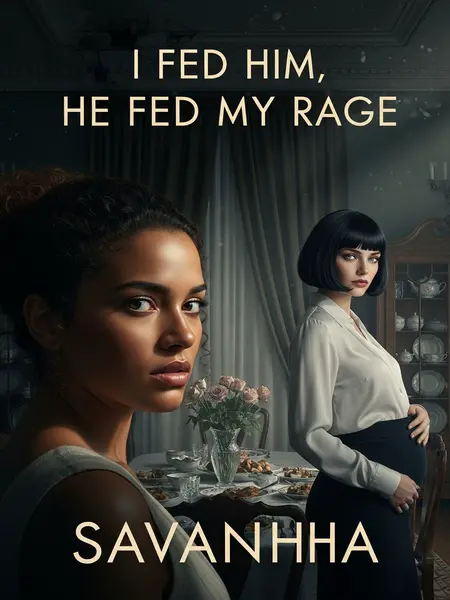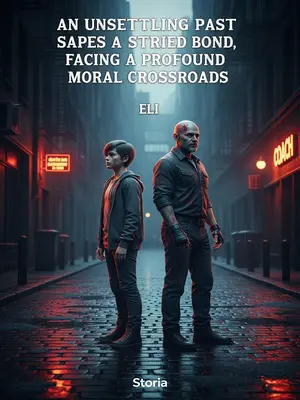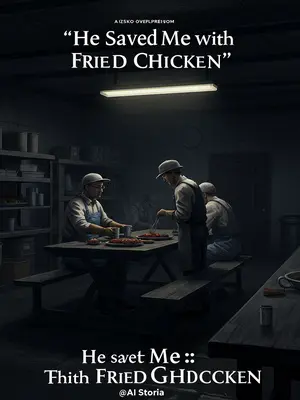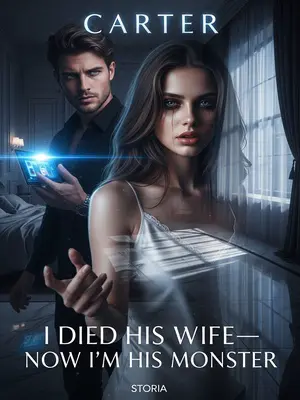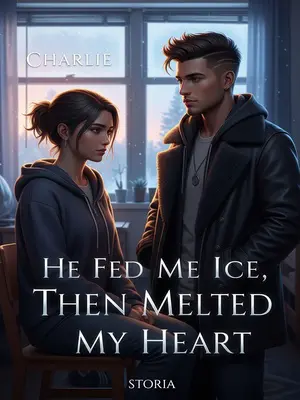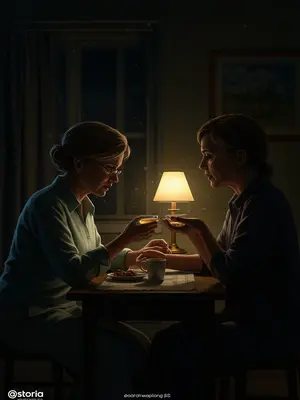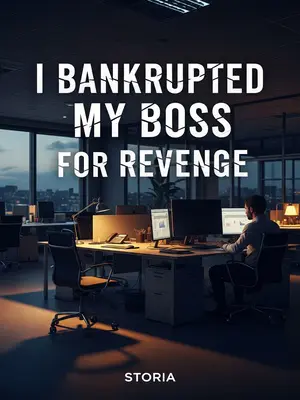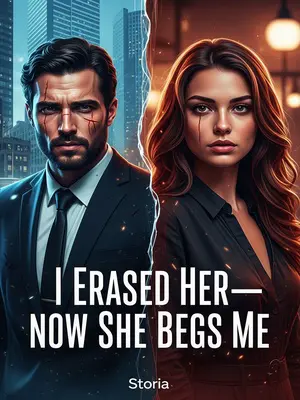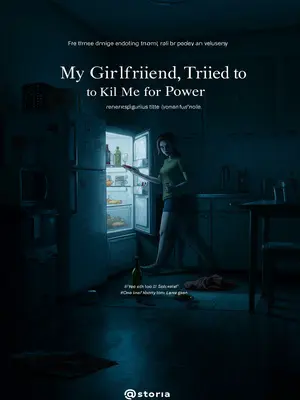Chapter 4: The Roots of Power
Two hours later, when I finally brought the chicken noodle soup—my hands shaking from years in the kitchen—I stood outside Cassie’s door, the aroma of fresh herbs filling the hallway. My ear to the door, I listened to the muffled voices inside.
The tray trembled in my grip, the scent of thyme and parsley strong enough to make my eyes water. I stood there, listening, heart heavy.
"I heard from the staff that the old lady was a maid too. She came from nothing, barely finished high school. If she could become the lady of the house, why can’t I?" Cassie’s voice rang out, smug and loud.
Her voice was full of bravado, but I heard the insecurity underneath. She wanted to believe it was that simple. She needed to.
Cassie was half right. Halfway to the truth, but never quite there.
She always got the facts, but never the truth. That was her problem—she thought she could game the system, but she didn’t know the rules. She never did.
I had indeed been a maid. That much was true.
My first days in the Whitaker house were spent scrubbing floors and peeling potatoes, hands raw and bleeding. The smell of bleach clung to my skin, no matter how much I washed.
When I first met the young lord, I was sprawled across a butcher’s block. I can still feel the cold wood against my cheek.
The memory still haunted me—the cold steel, the smell of blood, the fear in my gut. I was just another mouth to feed, another burden in a world that didn’t care. That fear never left me.
The world was always unfair. That was the first lesson I learned.
Some folks were born with silver spoons, others with empty bellies. That’s just how it was in our town. No amount of wishing could change it.
The Whitakers were rich as kings, but even here in this town, some were so poor they had to trade children for food. That was the way of things.
I’d seen it with my own eyes—neighbors forced to make impossible choices, selling what little they had to survive another winter. Their faces haunt me still.
Eighteen years ago, the young lord saved me from the butcher’s knife and, seeing my eyebrows singed by the stove, named me Savannah. The name fit like a second skin.
He said the name suited me, like the wild grasslands—tough, resilient, impossible to tame. I clung to it, made it my own. It was the first thing that was ever truly mine.
He brought me back to the Whitaker estate. I remember every step up that long drive.
It was the first time I’d ever seen marble floors, crystal chandeliers, rooms bigger than my childhood house. I felt like an imposter, always waiting to be sent back. My heart thudded in my chest.
Since I’d hauled water and chopped wood since childhood, I was stronger than the maids who’d grown up indoors, so I was sent to the kitchen to learn to cook. The work was hard, but it made sense to me.
The head cook took me under her wing, teaching me the family recipes, the little tricks that made all the difference. I learned fast—survival depended on it. Every day was a test.
Later, I became an excellent cook, especially good at handling game and meat. By sheer luck, Mr. Whitaker—the young lord’s father—picked me to marry his son. I never understood why.
It was a surprise to everyone, most of all to me. I went from kitchen help to lady of the house overnight, and the world never let me forget it. Some days, I never let myself forget it either.
And from the wedding night onward, I started to uncover the secrets buried in generations of the charming, golden Whitaker family. The weight of them nearly crushed me.
Secrets whispered in the dark, hidden behind locked doors and polite smiles. The kind of secrets that changed everything you thought you knew. I learned to keep my mouth shut.
But Cassie didn’t know. She had no idea what she was up against.
She thought she was the first to play the game, but she didn’t know how deep the roots ran. She was just a sprout among oaks.
None of the staff left alive knew either.
Most of the old staff were long gone, replaced by new faces who didn’t know the history, didn’t care to learn it. The stories faded with them.
I wasn’t the young lord’s mother—I was his wife. That was the truth, plain and simple.
It was a truth I kept close, like a secret locket. Most days, it felt like a burden more than a blessing. Heavy as lead against my heart.
They all thought I was the elderly mother he brought back from his hometown three years ago. The lie had become its own kind of comfort.
It was easier that way. No one asked questions, no one dug too deep. I let them believe what they wanted. It was safer that way.
The heat from the soup in my hands pulled me out of my memories. I blinked, the past dissolving into steam.
The steam fogged my glasses, the bowl heavy in my grip. I steadied myself, pushing the past aside. There was work to do.
I heard Cassie, still foolishly boasting, "I’m not just any ordinary maid. I came from a technologically advanced future. Some of us transmigrator women invented soap, some made engines and steel, some even built rockets to travel the stars… Just a little of my modern knowledge could make the Whitaker family soar."
Her words tumbled out, fast and breathless, like she couldn’t wait to be believed. But she didn’t notice the boredom in the young lord’s eyes. He’d heard it all before.
But the Whitakers were already rich beyond measure—how much higher could they climb? There was nowhere left to go.
We had everything money could buy, but it never seemed to be enough. The hunger was bottomless, always demanding more. It gnawed at us, day and night.
Was it the title…? The question echoed in my head.
Cassie wanted more than comfort—she wanted power. She thought she could buy her way in with secrets from another world. She had no idea how this place worked.
"All right, all right, calm down for now. I promise: as long as you give birth to the Whitaker family’s first grandson, not only can you be the official wife—if you want the household keys, I’ll put them in your hand too." The young lord’s words slid out like honey, smooth and sticky.
"Really?" Cassie’s voice was high with hope.
Cassie was overjoyed by the young lord’s sweet talk. She clapped her hands, her eyes shining with triumph. She thought she’d won, that the world was finally bending to her will.
But what she said was, "Who would’ve thought, me, a college student from the 21st century, would end up on the path to being a pampered wife, riding my child’s coattails." She grinned, the words tasting sweet on her tongue.
She laughed, a high, nervous sound, as if she still couldn’t believe her own luck. Her eyes darted around the room, looking for someone to share her excitement.
But I knew she’d never see that day. Not in this house.
The thought settled over me like a shroud. I’d seen too many like her, full of hope and ambition, only to be swallowed whole by the house. The walls had a way of closing in.
Because the Whitaker family’s garden was already filled with the buried bodies of transmigrator women. The ground out back was thick with secrets.
The roses grew thick and wild out back, their roots tangled around secrets no one dared speak aloud. Some nights, I’d hear whispers on the wind, voices that never quite faded. I pulled the curtains tight.
Hunting and eradicating transmigrators was the favorite pastime of the old-money elite in this town. They made a sport of it.
It was a game to them, a way to prove their power. They called it tradition, but it was nothing more than cruelty dressed up in Sunday best. The rules never changed.
Transmigrators had no paperwork—no legal trouble would ever come of it. They were ghosts in the system.
No birth certificates, no Social Security numbers, nothing to tie them to this world. They could disappear without a trace, and no one would ever ask questions. That was the real danger.
Their unwillingness to bow to tradition, the longing for freedom and equality in their eyes—that was how you spotted a transmigrator. It was always in the eyes.
They stood out, no matter how hard they tried to blend in. It was in the way they spoke, the way they dreamed out loud. They couldn’t help themselves.
And the thought of snuffing out those eyes, never letting them rest, was enough to set any noble’s blood racing. The thrill was in the hunt.
It was the only thrill left to people who’d already bought everything else. The hunt, the conquest, the final, terrible silence. The garden was always hungry.
